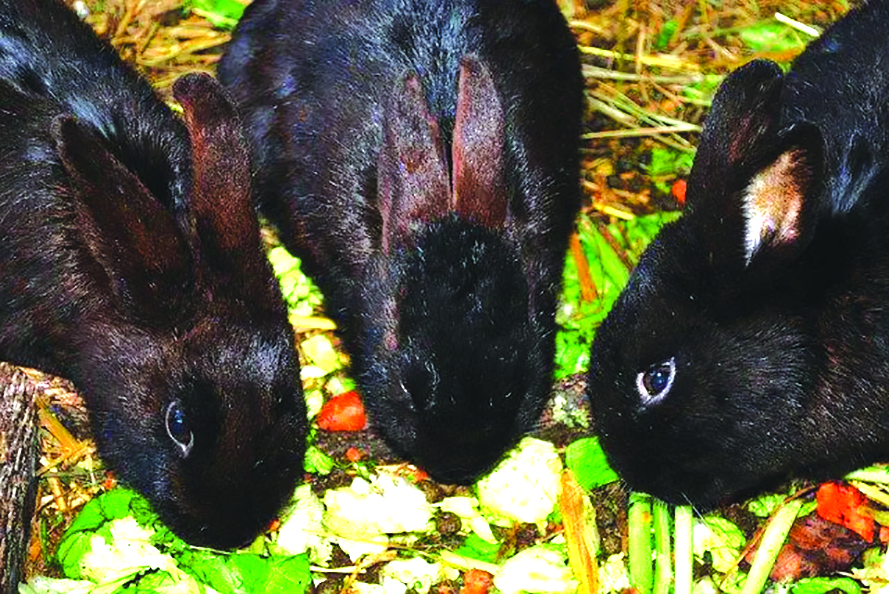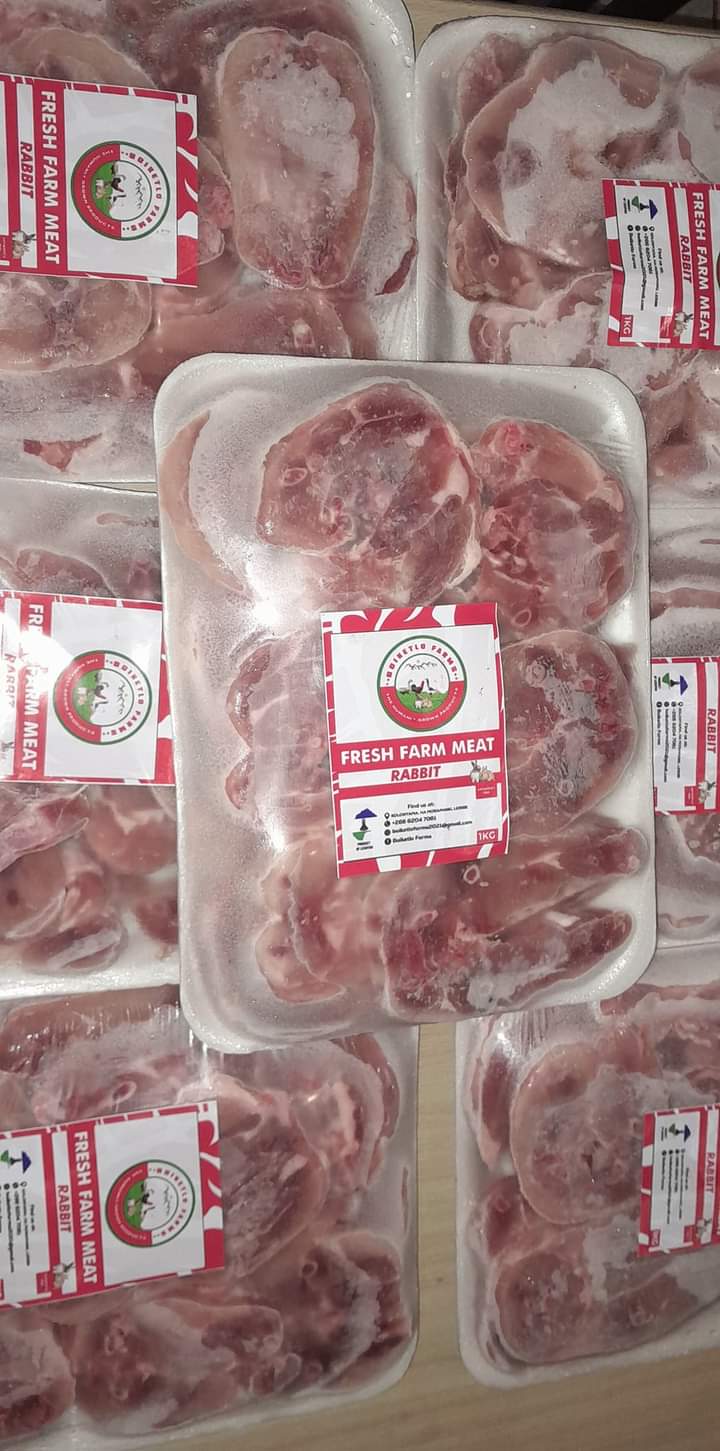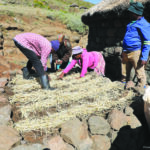Staff Reporter
Lesotho faces significant challenges in achieving self-sufficiency in cereal, meat, and vegetable production, according to the United Nations (UN) Lesotho.
Even in favourable years, the country meets only 30 percent of its cereal needs, relying heavily on imports, primarily from South Africa.
This reliance, according to the UN, results in high food prices and increases the vulnerability of households engaged in low-productivity farming, herding, or informal employment.
It said currently, Lesotho is grappling with drought and the impacts of El Niño, leaving over 699,000 people food insecure.
“In response, Prime Minister Samuel Matekane declared a state of food disaster on 12 July 2024,” the UN Communications Office said in a statement yesterday.
It indicated that despite these challenges, Lesotho holds considerable potential for expanding its horticulture, meat, poultry, and dairy industries.
“Opportunities also exist in trout farming in the highlands and growing fruits and vegetables,” the UN said.
“However, only about 10 percent of Lesotho’s arable land is actively farmed, with even less under irrigation,” it added.
It further mentioned that given that agriculture employs approximately 38 percent of the population, these sectors are crucial for poverty reduction and rural development.
The statement was released to announce senior UN officials’ visit to Lesotho to bolster agricultural investment.
“On the invitation of His Majesty King Letsie III, who serves as the FAO (Food and Agriculture Organisation) Special Goodwill Ambassador for Nutrition, a high-level delegation from three UN agencies will visit Lesotho from 4-6 August 2024,” the statement read.
“The delegation includes FAO Director-General QU Dongyu, WFP Assistant Executive Director for Programme and Policy Development Valerie Guarnieri, and IFAD Associate Vice-President for Programme Management Donal Brown,” it added.
This visit aims to strengthen investment in Lesotho’s agricultural sector and support the country’s efforts to improve food and nutrition security. UN said this impending visit further aims to explore and support strategies to harness the potential and move towards greater self-sufficiency and food security.
“In the National Strategic Development Plan II (NSDP II), the Government of Lesotho recognises that improving nutrition by increasing agricultural production and resilience is crucial for sustainable development,” the statement read.
“To transform Lesotho’s food systems, the government acknowledges the interdependence of the country’s agriculture and ecosystem health and has committed to reverse environmental degradation and adapt to climate change,” it added.
UN further mentioned that despite the progress of various initiatives, Lesotho remains highly vulnerable to the impacts of climate change. It said there is a pressing need for substantial investment in green technologies and early warning systems to enhance the country’s resilience to climate shocks.
“The visiting delegation will engage with His Majesty King Letsie III, senior government officials, and representatives from civil society, the private sector, women and youth groups, and people with disabilities. Their visit will include a joint field visit, stakeholder meetings, and a high-level dialogue on food systems,” it said.
Last month, World Vision Lesotho (WVL) warned that the country is teetering on the edge of a humanitarian catastrophe.
“This crisis, unfolding in the shadow of global attention, threatens the very fabric of Basotho communities,” WVL stated. The organisation noted that the scale of this disaster was overwhelming; across Southern Africa, 40 to 80 percent of the maize crop has been lost, but the impact on Lesotho is particularly devastating.
“An alarming 700,000 Basotho—nearly one-third of the country’s population—now face severe food insecurity. This marks a distressing increase from 582,000 just a year ago, highlighting the rapidly deteriorating situation,” WVL said.
In June this year, Newsday reported that Lesotho was grappling with an alarming food insecurity crisis, requiring an urgent M1.2 billion to address the growing needs of its population.
This, according to the publication, was disclosed by Reatile Elias, the Chief Executive Officer (CEO) for the Disaster Management Authority (DMA) during the closing ceremony of the Africa CDC’s African Volunteer Health Corps initiative, Strengthening and Utilising Response Groups for Emergencies (AVoHC-SURGE) training in Leribe.
The report highlighted that the number of people in a food insecurity crisis had increased significantly, with close to 700,000 people across the country expected to be in a food insecurity crisis by October this year.
The resources needed to combat this crisis have surged dramatically, from around M300 to M500 million last year to at least M1.2 billion this year.
This Newsday report was substantiated by Prime Minister Ntsokoane Samuel Matekane last month.
In a televised address on July 12, when declaring a state of disaster, Matekane stated that the country requires M1.2 billion to tackle the urgent crisis of food insecurity.
He announced that the declaration of the state of disaster would lapse on March 31, 2025, and called on aid organisations for assistance. He said the government had allocated M200 million to help address the situation.Kay
UN highlights food crisis in Lesotho
Staff Reporter
Lesotho faces significant challenges in achieving self-sufficiency in cereal, meat, and vegetable production, according to the United Nations (UN) Lesotho.
Even in favourable years, the country meets only 30 percent of its cereal needs, relying heavily on imports, primarily from South Africa.
This reliance, according to the UN, results in high food prices and increases the vulnerability of households engaged in low-productivity farming, herding, or informal employment.
It said currently, Lesotho is grappling with drought and the impacts of El Niño, leaving over 699,000 people food insecure.
“In response, Prime Minister Samuel Matekane declared a state of food disaster on 12 July 2024,” the UN Communications Office said in a statement yesterday.
It indicated that despite these challenges, Lesotho holds considerable potential for expanding its horticulture, meat, poultry, and dairy industries.
“Opportunities also exist in trout farming in the highlands and growing fruits and vegetables,” the UN said.
“However, only about 10 percent of Lesotho’s arable land is actively farmed, with even less under irrigation,” it added.
It further mentioned that given that agriculture employs approximately 38 percent of the population, these sectors are crucial for poverty reduction and rural development.
The statement was released to announce senior UN officials’ visit to Lesotho to bolster agricultural investment.
“On the invitation of His Majesty King Letsie III, who serves as the FAO (Food and Agriculture Organisation) Special Goodwill Ambassador for Nutrition, a high-level delegation from three UN agencies will visit Lesotho from 4-6 August 2024,” the statement read.
“The delegation includes FAO Director-General QU Dongyu, WFP Assistant Executive Director for Programme and Policy Development Valerie Guarnieri, and IFAD Associate Vice-President for Programme Management Donal Brown,” it added.
This visit aims to strengthen investment in Lesotho’s agricultural sector and support the country’s efforts to improve food and nutrition security. UN said this impending visit further aims to explore and support strategies to harness the potential and move towards greater self-sufficiency and food security.
“In the National Strategic Development Plan II (NSDP II), the Government of Lesotho recognises that improving nutrition by increasing agricultural production and resilience is crucial for sustainable development,” the statement read.
“To transform Lesotho’s food systems, the government acknowledges the interdependence of the country’s agriculture and ecosystem health and has committed to reverse environmental degradation and adapt to climate change,” it added.
UN further mentioned that despite the progress of various initiatives, Lesotho remains highly vulnerable to the impacts of climate change. It said there is a pressing need for substantial investment in green technologies and early warning systems to enhance the country’s resilience to climate shocks.
“The visiting delegation will engage with His Majesty King Letsie III, senior government officials, and representatives from civil society, the private sector, women and youth groups, and people with disabilities. Their visit will include a joint field visit, stakeholder meetings, and a high-level dialogue on food systems,” it said.
Last month, World Vision Lesotho (WVL) warned that the country is teetering on the edge of a humanitarian catastrophe.
“This crisis, unfolding in the shadow of global attention, threatens the very fabric of Basotho communities,” WVL stated. The organisation noted that the scale of this disaster was overwhelming; across Southern Africa, 40 to 80 percent of the maize crop has been lost, but the impact on Lesotho is particularly devastating.
“An alarming 700,000 Basotho—nearly one-third of the country’s population—now face severe food insecurity. This marks a distressing increase from 582,000 just a year ago, highlighting the rapidly deteriorating situation,” WVL said.
In June this year, Newsday reported that Lesotho was grappling with an alarming food insecurity crisis, requiring an urgent M1.2 billion to address the growing needs of its population.
This, according to the publication, was disclosed by Reatile Elias, the Chief Executive Officer (CEO) for the Disaster Management Authority (DMA) during the closing ceremony of the Africa CDC’s African Volunteer Health Corps initiative, Strengthening and Utilising Response Groups for Emergencies (AVoHC-SURGE) training in Leribe.
The report highlighted that the number of people in a food insecurity crisis had increased significantly, with close to 700,000 people across the country expected to be in a food insecurity crisis by October this year.
The resources needed to combat this crisis have surged dramatically, from around M300 to M500 million last year to at least M1.2 billion this year.
This Newsday report was substantiated by Prime Minister Ntsokoane Samuel Matekane last month.
In a televised address on July 12, when declaring a state of disaster, Matekane stated that the country requires M1.2 billion to tackle the urgent crisis of food insecurity.
He announced that the declaration of the state of disaster would lapse on March 31, 2025, and called on aid organisations for assistance. He said the government had allocated M200 million to help address the situation.
Summary
- “On the invitation of His Majesty King Letsie III, who serves as the FAO (Food and Agriculture Organisation) Special Goodwill Ambassador for Nutrition, a high-level delegation from three UN agencies will visit Lesotho from 4-6 August 2024,” the statement read.
- “To transform Lesotho’s food systems, the government acknowledges the interdependence of the country’s agriculture and ecosystem health and has committed to reverse environmental degradation and adapt to climate change,” it added.
- This, according to the publication, was disclosed by Reatile Elias, the Chief Executive Officer (CEO) for the Disaster Management Authority (DMA) during the closing ceremony of the Africa CDC’s African Volunteer Health Corps initiative, Strengthening and Utilising Response Groups for Emergencies (AVoHC-SURGE) training in Leribe.

Your Trusted Source for News and Insights in Lesotho!
At Newsday Media, we are passionate about delivering accurate, timely, and engaging news and multimedia content to our diverse audience. Founded with the vision of revolutionizing the media landscape in Lesotho, we have grown into a leading hybrid media company that blends traditional journalism with innovative digital platforms.










